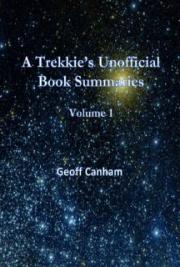


These pages contain summaries of most of the Star Trek books I've read, and I include how the story ends (but you know who's going to win at the end anyway, don't you?) These are not meant to be reviews, and in no way reflect on whether I liked the book or not. OK, I liked all of them simply because they are Star Trek, but I did enjoy some more than others.
I prepared the summaries originally to give myself an easy way to remember what the storylines were, without having to dig through hundreds of books, and I hope you find the information useful in that way. The summaries have accumulated over many decades, so there will be some variation in style and length. I originally aimed for producing a one paragraph summary for each book, but those paragraphs often grew to be more like full pages.
Generally speaking, I have listed the books in order of publication date, which was also mainly the order that I read them. However, for this book I have brought together stories that are part of a series.
There have been novelizations of the Star Trek films and of some of the TV episodes, but I have not written summaries for those, as it much more fun watching reruns of them. Besides, at least for the films, you should be able to find plot summaries on Wikipedia.
Almost all of these novels are still available for purchase, often in paperback form and almost certainly as a Kindle edition, so you can get into binge-reading.
When a well-known novel gets made into a film, there are frequently complaints that this part or that part of the story is left out of the film. Unfortunately, that has to happen because there simply isn't time to cover everything in the two hours or less of a film. Likewise, in summarizing the books I have had to leave out subplots and even simplify the main plot even more than a filmmaker has to.
If you are interested in what is my favorite novel from the Original Series, it would have to be "How Much for Just the Planet?" That novel had me doubling up with laughter. In second place would come anything by Peter David.
Geoff was eleven years old when Sputnik 1 launched the Space Age, and fourteen when Yuri Gagarin lifted off in Vostok 1 to start the era of manned space flight. Geoff had been interested in science and astronomy from an early age, and to find himself in the era of space exploration was extremely exciting to him.
By 1969, he had moved from England to Ireland, so he saw Neil Armstrong makes his 'one giant leap for mankind' while sampling poteen for the first time at a friend’s apartment in Cork. By that time, the original Star Trek TV series had completed its three seasons in the U.S., but it was several years later that Geoff first saw it. Seeing that magnificent white starship sailing majestically through the galaxy endeared him immediately to the series.
His interests in science tend to center around neuroscience, cosmology and quantum physics, which are subjects that frequently come up in the Star Trek episodes, and in the novels. While that may not be a good reason for him spending decades summarizing the novels, he thinks he can use it as a reasonable excuse.
His dissertation project for his MSc in IT was a learning management system for teaching computer technology. The IT section of Lara Academy runs a much simplified version of that.
You can reach Geoff at gcanham@compuserve.com. He is @GeoffCanham on Twitter, and you can find him on Facebook at www.facebook.com/geoff.canham, although he doesn’t make a lot of use of social media. No 5 a.m. Tweets from him.
His first book is "Free Will or Won't ... are we in charge of our lives or not?", available in paperback and Kindle ebook formats.
His Goodreads page can be found at www.goodreads.com/author/show/18839749.Geoff_Canham, and his Amazon Author page at www.amazon.com/-/e/B07TFBL3FC